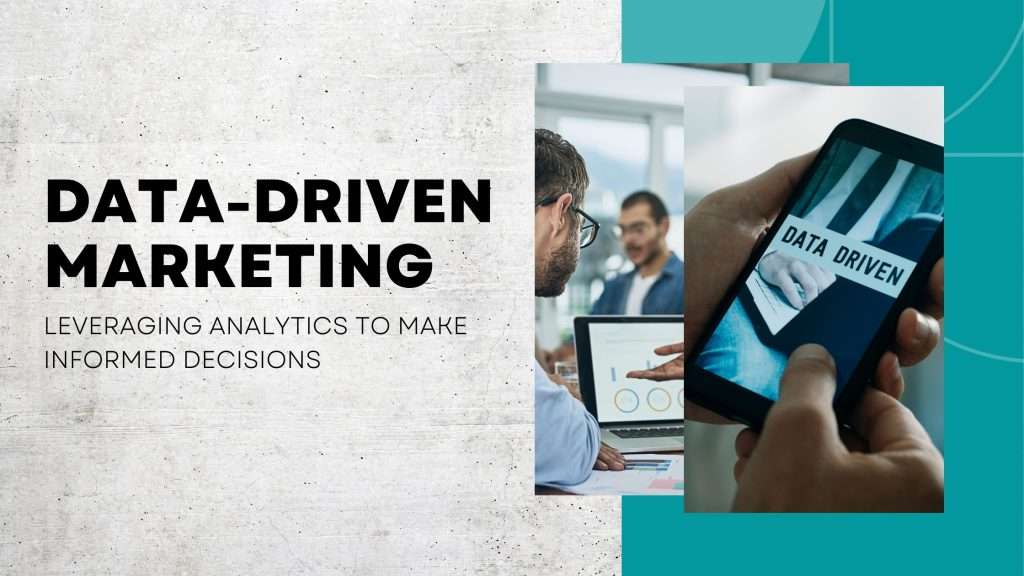Are you tired of making marketing decisions based on intuition and guesswork? It’s time to embrace the power of data-driven marketing! In today’s fast-paced digital world, analytics has become an indispensable tool for businesses looking to stay ahead of the competition. By leveraging data and insights, you can make informed decisions that will drive your marketing efforts towards success.
Join us as we delve into the exciting realm of data-driven marketing and discover how it can revolutionize your business strategies. Get ready to unlock a whole new level of precision, effectiveness, and growth in your marketing endeavors!
Introduction to Data-Driven Marketing
Data-driven marketing is a strategy that uses data and analytics to drive decision-making and optimize marketing efforts. This approach allows marketers to make informed decisions based on real-time insights, rather than relying on intuition or guesswork. By leveraging the power of data, businesses can create more targeted and personalized campaigns that resonate with their audience and drive better results.
In today’s digital age, there is an abundance of data available from various sources such as social media, website traffic, customer interactions, and more. This presents a huge opportunity for businesses to use this data to their advantage through data-driven marketing. By analyzing this information, companies can gain valuable insights into consumer behavior, preferences, and trends.
One of the main reasons why data-driven marketing is important is because it helps businesses understand their customers better. By collecting and analyzing data about their target audience’s behavior patterns, interests, and needs, companies can tailor their messaging and offerings accordingly. This not only improves the overall customer experience but also increases the chances of converting leads into paying customers.
Data-driven marketing also enables businesses to measure the success of their campaigns accurately. With traditional forms of advertising like print or TV ads, it can be challenging to determine exactly how many people saw the ad or took action as a result. However, with data-driven marketing techniques like tracking website visits or click-through rates on email campaigns, companies can get precise metrics on campaign performance in real-time.
How Analytics Can Help Your Business
Analytics refers to the process of collecting, analyzing, and interpreting data to gain insights and make informed decisions. In today’s fast-paced business environment, where competition is fierce and consumer behavior is constantly changing, having a data-driven approach is crucial for long-term success. This is where analytics comes in – it provides businesses with valuable information that can help them understand their customers better, identify trends and patterns, and ultimately drive growth.
So, how exactly can analytics help your business? Let’s take a closer look at some key areas where leveraging analytics can make a significant impact.
1. Understanding Customer Behavior: One of the most significant benefits of analytics for businesses is its ability to provide deep insights into customer behavior. By tracking and analyzing customer data such as purchase history, website clicks, social media interactions, and more, businesses can gain a better understanding of who their customers are, what they want, and how they behave. This information can then be used to tailor marketing strategies that resonate with the target audience and improve overall customer experience.
2. Identifying Market Trends: Analytics also allows businesses to keep track of market trends by monitoring both internal data (e.g., sales reports) and external data (e.g., industry reports). By identifying patterns in this data, businesses can stay ahead of the curve and adjust their strategies accordingly.

Types of Data Used in Marketing
There are various types of data that play a crucial role in marketing strategies. Each type of data provides unique insights and helps marketers make informed decisions. Here are some of the most commonly used types of data in marketing:
1. Demographic Data:
Demographic data includes information about age, gender, income, education level, and other characteristics that define a specific group of people. This type of data helps marketers understand their target audience’s basic traits and tailor their messaging accordingly.
2. Psychographic Data:
Psychographic data focuses on understanding consumers’ attitudes, values, interests, and lifestyles. It provides deeper insights into consumer behavior and motivations, helping marketers create more personalized campaigns.
3. Behavioral Data:
Behavioral data tracks how consumers interact with a brand online. This can include website visits, clicks on ads or emails, social media engagement, purchase history, etc. By analyzing this data, marketers can understand how customers engage with their brand and optimize their marketing efforts accordingly.
4. Geographical Data:
Geographical data provides information about a customer’s location such as country, state/province/region, city/town/village. It helps businesses target specific regions or locations for their marketing campaigns based on factors like cultural differences or regional preferences.
Implementing a Data-Driven Strategy
In today’s digital age, data is more valuable than ever before. It holds the key to understanding consumer behavior, market trends, and overall business performance. As a result, many successful companies have shifted their focus to a data-driven strategy in order to make informed decisions and achieve optimal results.
So what exactly is a data-driven strategy? Simply put, it is the use of data analytics to drive decision-making processes within an organization. This approach involves collecting, analyzing, and interpreting data in order to gain insights and make informed decisions that will ultimately lead to business growth.
There are several steps involved in implementing a successful data-driven strategy:
1. Define Your Objectives: The first step in implementing a data-driven strategy is identifying your business objectives. What do you want to achieve? Whether it’s increasing sales, improving customer retention or launching a new product line, your objectives should be clear and specific.
2. Collect Relevant Data: Once you have defined your objectives, the next step is gathering relevant data that will help you achieve those goals. This can include both internal and external sources such as website traffic, social media engagement, customer demographics and industry trends.
3. Analyze Your Data: With the abundance of available data comes the challenge of making sense of it all. This is where analytics come into play. Utilizing various tools such as Google Analytics or Adobe Analytics can help you uncover patterns and trends within your data that will inform your decision-making process.
Case Studies: Successful Data-Driven Marketing Campaigns
Case studies are a great way to learn from real-world examples and understand the impact of data-driven marketing campaigns. In this section, we will take a closer look at some successful data-driven marketing campaigns that have leveraged analytics to make informed decisions.
1. Amazon: Personalization and Recommendation Engine
Amazon is known for its highly successful personalization strategy, which is driven by data analysis. The company collects vast amounts of customer data, including browsing history, purchase history, demographics, and more. This data is then used to power their recommendation engine, which suggests products to customers based on their preferences and behavior. As a result, Amazon has seen a significant increase in sales and customer loyalty.
2. Coca Cola: Social Media Listening
Coca Cola’s “Share a Coke” campaign was one of the most successful marketing campaigns in recent years. The company used social media listening tools to gather insights about their target audience’s interests and behaviors. They then personalized their bottles with popular names and phrases that resonated with their audience. This campaign led to an increase in brand awareness, engagement on social media platforms, and ultimately sales.
3. Netflix: Content Curation through Data Analysis
Netflix has become synonymous with personalized content recommendations for its users. The streaming giant uses machine learning algorithms to analyze user behavior such as viewing history, ratings, search queries, and more to curate personalized content recommendations for each user. This approach has significantly improved user retention rates and helped Netflix stand out from its competitors.
Common Challenges and Solutions in Data-Driven Marketing
Data-driven marketing has become an essential strategy for businesses looking to stay ahead in the competitive market. By utilizing data and analytics, companies can make informed decisions that lead to more effective and targeted marketing campaigns. However, like any other approach, data-driven marketing also comes with its own set of challenges. In this section, we will discuss some of the most common challenges faced by businesses in implementing data-driven marketing and provide potential solutions.
1. Data Quality Issues:
One of the biggest challenges faced by companies in data-driven marketing is ensuring the quality of their data. With the vast amount of information available, it can be challenging to filter through and identify relevant and accurate data points. Poor-quality data can lead to inaccurate insights, which ultimately result in ineffective decision-making.
Solution: To overcome this challenge, businesses must invest in a reliable data management system that cleanses and organizes their data effectively. Regular audits should also be conducted to ensure that the collected data is still relevant and up-to-date.
2. Lack of Skilled Workforce:
Another significant challenge faced by organizations is a lack of skilled professionals who can handle complex analytics tools and interpret data accurately. This limitation often leads to a delay in implementing necessary changes based on gathered insights or even incorrect analysis.
Solution: Companies should invest in training programs for their employees or hire professionals with expertise in handling big data analytics tools. This will enable them to leverage their resources efficiently and make more accurate decisions based on collected insights.
The Future of Data-Driven Marketing
The future of data-driven marketing is an exciting and rapidly evolving landscape. With the rise of technology and the increase in available data, businesses are now able to gather and analyze vast amounts of information about their consumers. This has opened up a world of opportunities for marketers to make informed decisions based on data insights, rather than relying on intuition or guesswork.
One of the key trends that will shape the future of data-driven marketing is the use of artificial intelligence (AI) and machine learning. These technologies have already made significant strides in helping businesses collect, organize, and analyze large volumes of data. AI-powered algorithms can identify patterns, behaviors, and preferences among consumers at a speed that would be impossible for humans to achieve.
As AI continues to advance and become more accessible, it will enable marketers to personalize their strategies even further. By leveraging AI-powered analytics tools, businesses can create highly targeted campaigns tailored to individual customers’ needs and interests. This level of personalization can improve customer engagement, loyalty, and ultimately drive sales.
Another major trend in the future of data-driven marketing is the increasing importance of real-time analytics. With consumers expecting instant gratification in today’s fast-paced world, businesses must be able to respond quickly to changing market conditions and consumer behavior. Real-time analytics allow marketers to monitor their campaigns’ performance in real-time, enabling them to make adjustments as needed for maximum effectiveness.
Conclusion:
As we navigate the digital era, data-driven marketing is not just a trend; it’s a necessity. By harnessing the power of analytics, marketers can unlock a treasure trove of insights that inform strategic decisions, drive impactful campaigns, and ultimately propel businesses to success in an increasingly competitive landscape. Embrace the data-driven mindset, and watch as your marketing efforts transform from educated guesses to well-informed strategies that resonate with your audience and drive tangible results.

